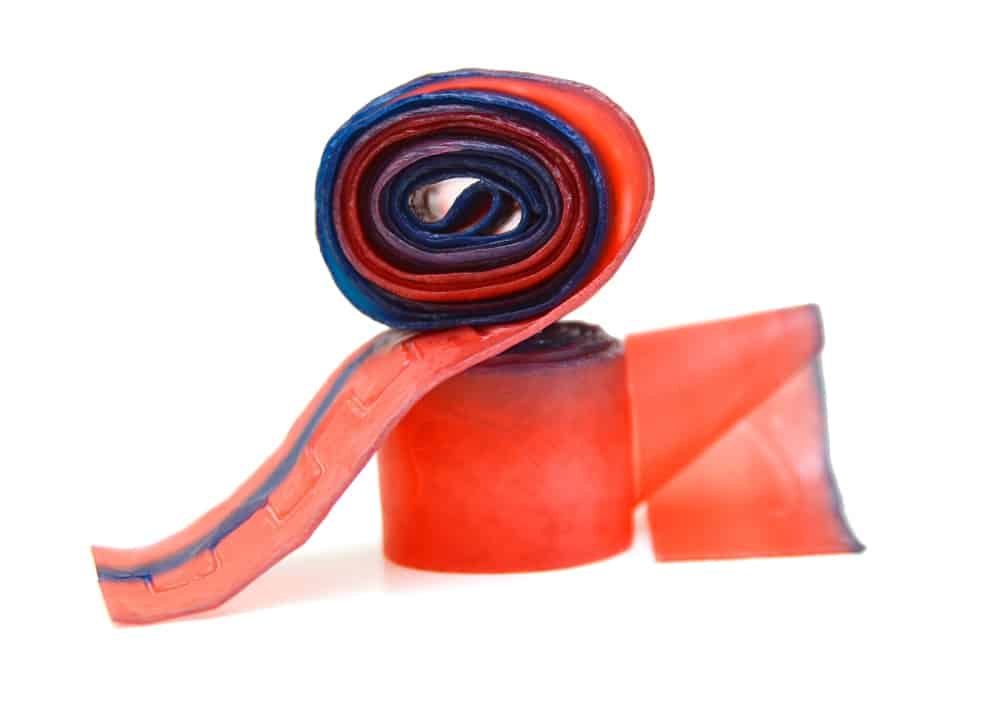Fruit by the Foot is a popular fruit snack distributed under the Betty Crocker brand – alongside other widely known snacks such as Fruit Gushers and Fruit Roll-Ups. Characterized as a lengthy strip of candy, Fruit by the Foot is estimated to be an average of three feet long. Initially created in 1991, the fruit snack is often compared with the other fruit-flavored snacks of Betty Crocker because they are all produced using similar ingredients.
Fruit by the Foot does not contain any animal product or derivative which means the fruit snack should be fine for vegan lifestyles. However, some cautious vegans might rather avoid Fruit by the Foot because it contains some questionable ingredients. Namely, the snack contains sugar, natural flavors, and artificial coloring agents that are commonly referred to as gray area ingredients because while some vegans are fine with them, some vegans do not trust those ingredients to be completely vegan.
Table of Contents
Is Fruit by the Foot Vegan?

To dietary vegans, Fruit by the Foot should be fine since it does not contain any obvious or blatant animal product in its ingredients list. However, there are some vegans that are warier than others. This means that there are some vegans that would avoid substances considered gray area ingredients. These are ingredients that are vegan for some people but might be non-vegan for others. These are ingredients some vegans avoid, and Fruit by the Foot has three of these gray area ingredients.
Namely, Fruit by the Foot contains sugar, natural flavors, and artificial coloring agents. Each of these ingredients is problematic in one way or another. For example, sugar and natural flavors are considered gray area ingredients because of the uncertainty of their nature. On the other hand, it is certain that artificial coloring agents are devoid of animal products. However, the issue with artificial coloring agents is an ethical one.
Fruit by the Foot Ingredients List
The list of ingredients of Fruit by the Foot typically includes (1): sugar, maltodextrin, corn syrup, pear puree concentrate, palm oil. Contains 2% less or less of: carrageenan, citric acid, monoglycerides, sodium citrate, acetylated monoglycerides, malic acid, xanthan gum, vitamin C (ascorbic acid), locust bean gum, potassium citrate, natural flavor, color (red 40, blue 1, yellow 5).
The official Betty Crocker website lists four different flavors (2): Strawberry, Variety Pack, Flavor Mixers, and Berry Tie-Dye. However, the ingredients are almost identical in the different flavors listed. It should be noted that key differences in the ingredients of the different flavors of Fruit by the Foot are mainly the food coloring agents used.
Sugar
Sugar is an incredibly common ingredient used in food and beverage products, and it is primarily used as a sweetener in the industry. Also known as sucrose, sugar is conventionally produced from certain plant sources such as sugarcane and sugar beets. However, sugar can still become non-vegan despite its botanical origins.
Once the sugar has been extracted from an appropriate plant source, many sugar companies further refine the sugar to make it more appealing to mass consumers. Further refinement processes make the sugar whiter and finer. There are different methods used in further refining sugar, but one common method is filtration.
Filtering removes non-sugar components and increases the overall purity of the sugar. Different companies can utilize different filtration methods, but the issue is when companies use bone char for this step (3). Bone char is an effective and cheap material for filtration. However, bone char is the charred skeletal remains of animals. Thus, sugar produced using bone char cannot be considered vegan due to the involvement of an animal product.
A problem with the use of bone char in the sugar industry is that it is difficult to determine if whether the sugar a person is consuming was produced with bone char or not. The problem is further exacerbated when a large food company uses sugar in their products because they can potentially have multiple sources of sugar. This is why sugar is common considered a gray area ingredient because of the uncertainty surrounding it. There are vegans who purposely avoid sugar to minimize the risks of accidentally eating something non-vegan.
The use of bone char in the sugar industry is more prevalent in the US which is why vegans in other parts of the world are not as concerned with sugar.
Natural Flavors
Natural flavors are a common additive that can be found in many food and beverage products. As defined by the FDA, natural flavors primarily serve as flavoring agents which means they do not serve other functional roles in the product. In contrast to artificial flavors, natural flavors are required to be completely made of substances that can be derived from natural sources.
The issue vegans have with natural flavors is the wide scope its definition has. Specifically, the FDA defines natural flavors as (4):
The essential oil, oleoresin, essence or extractive, protein hydrolysate, distillate, or any product of roasting, heating or enzymolysis, which contains the flavoring constituents derived from a spice, fruit or fruit juice, vegetable or vegetable juice, edible yeast, herb, bark, bud, root, leaf or similar plant material, meat, seafood, poultry, eggs, dairy products, or fermentation products thereof, whose significant function in food is flavoring rather than nutritional.
FDA.gov
Unless stated in the packaging or confirmed by the company somehow, the definition of natural flavors does not give a clue to whether the product is vegan or not because of the umbrella definition of the ingredient. Specifically, natural flavors encompass both plant and animal products which mean natural flavors also fall into the gray area category for ingredients.
Food Coloring Agents
Snacks such as Fruit by the Foot use colors effectively since the different colors are indicative of the different flavors and since the snack is marketed for children. Many food products and beverages are naturally visually appealing, but there are those that have to be actively manipulated with the use of food coloring agents. There are many food coloring agents that are appropriate for vegans, but many vegans take issue with artificial coloring agents.
Artificial coloring agents are completely created in laboratories from rudimentary substrates. Thus, these artificial coloring agents do not contain any animal product or derivative. To dietary vegans, artificial coloring agents are perfectly fine. However, ethical vegans abstain from products that use artificial coloring agents.
Since artificial coloring agents are synthesized from scratch and are meant to be consumed by humans, they must undergo numerous safety tests to get the approval of various food safety authorities. Undeniably, safety is a priority. However, the methods of testing safety are in question.
It has been extensively documented that artificial coloring agents have undergone numerous safety tests that utilize animal models. The use of animal testing is considered to be highly unethical in the vegan community because of the inhumane treatment of the animals in these tests. Furthermore, the use of animal models in studies can already be effectively replaced by modern alternatives such as the use of cell models or the use of in silico studies (i.e., the use of computer modeling and algorithms).
Specifically, various flavors of Fruit by the Foot contain different artificial coloring agents such as red 40, blue 1, and yellow 5. These artificial coloring agents have been documented to be tested on various animals such as rats, mice, dogs, pigs, rabbits, and more(5, 6, 7).
References:
1. https://www.bettycrocker.com/
2. https://www.bettycrocker.com/
4. https://www.accessdata.fda.gov/
6. https://efsa.onlinelibrary.wiley.com/
7. https://efsa.onlinelibrary.wiley.com/
Editorial credit: Edgar Lee Espe / Shutterstock.com




